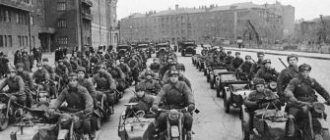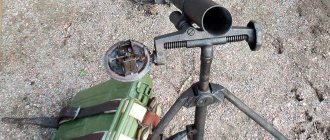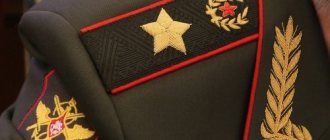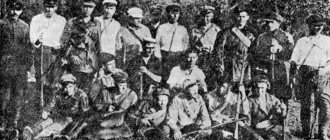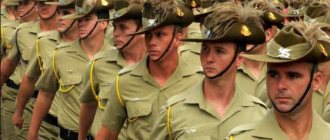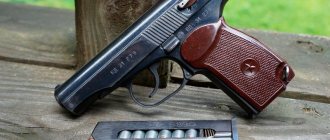So that a person is able to fully perform his own duties every day, have increased mental and physical activity, incl. to maintain his health, he needs 8 hours of good sleep. This regime of rest and work activity is especially important for conscripts, who must always be in good shape and ready at any time to defend their Motherland. As a rule, many young people of military age in civilian life do not follow a clear daily routine. Therefore, they are first recommended to study the daily routine in the army before conscription in order to prepare in advance.
As practice shows, 2 weeks are enough for a person to adapt after switching to a new work regime and rest time. But for young guys it’s better to start at home, in a more familiar and comfortable environment, in order to avoid these difficulties in the first days of military service.
Peculiarities of the daily routine in the army
It should immediately be noted that the army’s daily routine on weekdays is not too different from holidays and weekends. But there are still some differences in the routine. First of all, this is the lack of training sessions and the availability of more time for soldiers to rest. The daily routine is also slightly different on weekdays, when conscripts are given a bathhouse.
What is the daily routine for conscripted military personnel in the Russian Army in 2022:
6.00 – The fighters are getting up. The company orderly gives the command: “Company, rise!” Conscripts are required to immediately jump out of their beds, get dressed, and take their place in the ranks for morning physical exercises. Today in the army, conscripts are allowed to wear a tracksuit and sneakers for these procedures.
6.05 – 6.30 – Morning exercises.
6.30 – 7.00 – Hygiene procedures, making the bed. In just 30 minutes, each soldier must carefully make his own bed, go to the toilet, wash, put his uniform in order, get dressed and get into formation. At this event, soldiers are divided into separate groups, usually by platoons or squads. For example, one group makes up their beds and puts their clothes in order, the second goes to the toilet and washes up. This avoids crowding in the barracks, toilet and washbasin.
7.00 – 7.20 – Formation, inspection of appearance. After washing and making the beds, the company commander lines up the personnel to check their appearance. For example, the cleanliness of clothing and shoes is checked, the presence of a clean collar, etc. If any deficiencies are detected, the commander sends a soldier to eliminate them immediately. In this case, a visual inspection of the physical condition of subordinates is mandatory. If a fighter looks pale, coughs, or has obvious signs of fever, he is immediately sent to the medical unit.
7.20 – 8.00 – Breakfast. The fighters are given 40 minutes to eat. During this time, all personnel of the units should have time to have breakfast in the soldiers' canteen.
8.00 - 9.00 - General formation of all military personnel. Every Monday, the military unit commander sums up the results of work activities and service for the past week, sets tasks for the new week, and conducts briefings. During the formation, all significant announcements are made, and awards are presented to distinguished servicemen. In many military units, the ritual of raising the state flag of the Russian Federation during the Russian anthem is obligatory.
On subsequent working days, a standard army divorce is carried out in general formations. The deputy commander - chief political officer of the unit can provide information related to recent world events.
At the end of the morning divorce, the remaining time of the unit commander can be used to conduct training with conscript soldiers, depending on the functions that they cannot cope with. This could be, for example, training in making beds or putting on a gas mask and chemical protection suit for a while.
9.00 – 14.00 – Training sessions. These events are necessarily present in the daily routine in the army for conscript soldiers (except for holidays and weekends). As a rule, these are 3 pairs of training sessions in different disciplines. The third right is a little shorter in time; the remaining time is used to prepare conscripts for the next procedure.
14.00 - 14.20 – Checking the unit's personnel. The company duty officer lines up the soldiers in the barracks, checks their appearance and number. If someone is not in the ranks, the reason for his absence and the place where he is at the moment is found out.
14.20 - 15.00 – Lunch break.
15.00 - 15.30 – Distribution of personnel by department. The procedure is carried out on one of the parade grounds of the military unit, battalion by battalion, i.e. unit commanders carry out the separation of their subordinates.
15.30 - 18.00 – Classes. The fighters are again given 3 pairs of classes. On Monday and Thursday, soldiers also have a period for a bath (as a rule, in the army this is a regular public shower). In addition to taking a shower, fighters can wash their uniforms, underwear, clean their shoes, etc.
18.00 - 18.20 – Checking the vehicle. The fighters are lined up on the aisle, their presence and appearance are checked, if there was a bathhouse according to the plan, then the implementation of all established activities. The inspection is carried out by the company duty officer, points out deficiencies if they exist and demands their immediate correction.
18.20 - 19.00 - Dinner in the soldiers' canteen.
19.00 - 21.00 – Free time. Despite the strict regime in the army, soldiers must also rest, so the daily routine of conscript soldiers, incl. 2022 includes free time, which fighters can use at their discretion (get a haircut, shave, mend their uniform, write a letter to family, read a book, go to the gym, etc.).
21.00 - 21.15 – Watching the “Time” program. This procedure is mandatory, you cannot refuse, so the news is watched by all conscript personnel who are not involved in the squad or are not in the medical unit.
21.15 - 21.35 – Evening walk. Conscripted military personnel who are not in uniform, medical unit or hospital are lined up on the street and walk in a drill gait and always with a song around the territory of the military unit. The event is not held unless weather conditions permit (for example, heavy rain, gale, storm or blizzard).
21.35 - 21.45 – Evening check. The number of personnel on the list is checked. During this procedure, in addition to the unit duty officer who marshals the fighters, the company sergeant-major must be present. The sergeant-major gives the necessary instructions to the soldiers, reads out to the personnel, who the next day takes up duty, and determines the combat crew in case of a fire, natural disaster, or chemical (nuclear) attack.
21.45 - 22.00 – Getting ready for bed.
22.00 – Call-up for military personnel.
This is the entire daily routine in the army for conscript soldiers. On weekends it is slightly adjusted and approved by the unit commander every Wednesday.
General military regulations of the Armed Forces of the Russian Federation
General provisions
164. All premises and territory of the regiment are distributed between the units by the regiment commander.
When several military units are stationed in a military camp, the premises and territory between them are distributed by the head of the garrison or, by his order, the senior military camp.
165. Military personnel performing military service under a contract, and members of their families living with them, are provided with living quarters in accordance with the standards and in the manner prescribed by federal laws and other regulatory legal acts of the Russian Federation.
Military personnel undergoing military service upon conscription are accommodated in accordance with this Charter.
166. Female military personnel undergoing military service under a contract, as well as studying in military educational institutions of vocational education, are provided with living quarters in dormitories with a separate entrance before they enter into a contract for military service.
Sergeants filling the military position of company sergeant major or positions to be filled by warrant officers or officers are accommodated in dormitories, if possible, separately.
Soldiers, sailors, sergeants and foremen performing military service under a contract, in exceptional cases, may be temporarily housed in barracks separately from military personnel serving on conscription.
167. When staffing a company with military personnel undergoing military service on conscription, as well as military personnel undergoing military service under a contract in the military positions of sergeants and foremen, the latter are housed in separate premises of the barracks.
Military personnel - foreign citizens are accommodated for the entire period of military service in dormitories and are registered at the address of the military unit.
168. Military personnel undergoing military service upon conscription, except for those on ships, are accommodated in barracks.
Cadets of military educational institutions of vocational education, before concluding a contract for military service, are accommodated in barracks in the manner established for soldiers and sergeants undergoing conscription military service. Cadets who have entered into a contract, including family cadets, students who do not have officer ranks, can be accommodated in dormitories designed to accommodate cadets for the period of training.
The head of a military educational institution of vocational education, in the absence of residential premises in dormitories, has the right to allow family cadets who have entered into a contract for military service, as well as students who do not have officer ranks, to live outside the territory occupied by the military educational institution of vocational education, subject to the timely arrival of such military personnel to the place of training.
169. Each battalion (a separate unit of the regiment) is located, if possible, on a separate floor of the building or in a separate room.
At the battalion's location, rooms are allocated for the battalion commander, his deputies, battalion headquarters, for preparing for classes, holding meetings, and also for resting officers.
To conduct classes, the regiment is equipped with the necessary classrooms.
Each military unit is equipped with a room of military glory (history), a Book of Honor of the military unit (ship) is maintained, and a center (point) for psychological assistance and rehabilitation can also be equipped.
170. The following premises must be provided to accommodate the company:
sleeping quarters (living rooms);
room for information and leisure (psychological relief) for military personnel;
company office;
weapon storage room;
room (place) for cleaning weapons;
room (place) for sports activities;
service room;
a storage room for storing company property and personal belongings of military personnel;
room (place) for smoking and shoe shining;
clothes dryer;
wash room;
shower;
toilet.
171. It is prohibited for anyone to live in canteens, medical centers, clubs, boiler rooms, production and warehouse premises, parks and hangars, as well as in educational and office premises.
Military personnel in the regiment are prohibited from:
store political and pacifist propaganda materials, alcoholic beverages, narcotic drugs and psychotropic substances, as well as toxic, flammable and explosive substances at the place of their location;
collect signatures for any appeals;
organize and participate in gambling.
172. The placement of military personnel undergoing conscription military service (except for those on ships) in sleeping quarters (living rooms) is carried out at a rate of at least 12 cubic meters. meters of air volume per person.
The beds in the sleeping quarters (living rooms) of the company are arranged in a sequence corresponding to the company's official list, and so that near each of them or about two pushed together there is space for bedside tables, and between the rows of beds in the sleeping quarters there is enough space for building personnel; beds should be located no closer than 50 centimeters from the outer walls, maintaining alignment. Beds must be uniform.
Beds in the living rooms of the company should be arranged in one tier, and in the sleeping quarters two tiers are allowed.
173. For a serviceman who is permanently included in the list of a company (ship, boat) for a feat he has accomplished or as an honorary soldier (sailor), a bed is installed in a visible place in the sleeping quarters (living room), which is constantly kept in exemplary condition. A portrait of the hero and a description of his feat are hung in a frame above the bed.
174. The bedside table stores toiletries and shaving supplies, accessories for cleaning clothes and shoes, handkerchiefs, collar pads, bath accessories and other small personal items, as well as books, charters, photo albums, notebooks and other writing materials.
175. The beds of military personnel stationed in the barracks must consist of blankets, sheets, pillows with pillowcases, mattresses and bedding. Beds are made uniformly. It is forbidden to sit down and lie down on the bed in uniform (except for the company duty officer during rest).
176. The procedure for storing uniforms, other items of clothing for personal use of military personnel undergoing military service by conscription and under contract in military positions of soldiers, sailors, sergeants and foremen, as well as personal protective equipment, except for gas masks, is determined by the Minister of Defense of the Russian Federation.
Clothes, linen and shoes of company soldiers are dried in dryers if necessary.
The procedure for storing cameras, tape recorders, radios and other household electronic equipment and the procedure for using them at the regiment's location is determined by the regiment commander.
177. Small arms and ammunition, including training ones, in units are stored in a separate room with metal bars on the windows, which is under constant guard by persons on daily duty and equipped with technical security equipment, equipped with main and backup power sources, with information output (sound and light) to the regiment duty officer. The door of the room should be metal, lattice.
If it is impossible to install such a door, a metal door (covered with sheet iron) with an inspection window is installed.
Ceilings (ceilings), floors and walls must be strong and prevent the possibility of penetration into this room.
Machine guns, machine guns, carbines, rifles, target practice devices and hand grenade launchers, as well as bayonets (bayonets) must be stored in pyramids, and pistols and ammunition in metal, lockable cabinets (safes) or boxes.
Training weapons and training ammunition must be stored separately from combat weapons. In the absence of a separate pyramid, it is allowed to store training weapons together with combat ones; the place of its storage is indicated by the inscription: “Training weapons” and is separated by a partition. Training pistols are stored together with the combat pistols of soldiers and sergeants of the unit. Sports weapons are stored together with military weapons, the place of their storage is indicated by the inscription: “Sports weapons” and is separated by a partition.
The issuance of training and sporting weapons and training ammunition is carried out in the same way as the issuance of military weapons and ammunition.
It is prohibited to store property not related to weapon maintenance in weapon storage rooms, with the exception of gas masks and infantry blades.
178. Pyramids with weapons, cabinets (safes) and boxes with pistols and ammunition, as well as a room for storing weapons must be locked and sealed with mastic seals: pyramids and the room - with the seal of the company duty officer, cabinets (safes) and boxes with pistols and ammunition - the seal of the company sergeant major.
The keys to the room for storing weapons and pyramids must be in a separate bunch and must be kept by the company duty officer at all times, and the keys to cabinets (safes), boxes with pistols and ammunition must be kept by the company sergeant major. It is prohibited to hand over the keys to anyone, including during vacation.
Spare keys are stored: in the company - with the company commander in a sealed tube (pencil case) in a metal box (casket) locked by him; in the regiment - with the regimental duty officer in a locked metal box (casket) in tubes (pencil cases) sealed with the seals of the unit commanders.
All keys must have an accession number. Making duplicate keys is strictly prohibited. In case of loss (missing) of keys, the locks must be replaced immediately.
An inventory of military property is posted in the weapons storage room, which includes the number of pyramids, cabinets (safes), boxes, stands, posters and other property stored in this room related to the maintenance of weapons, as well as extracts from the Criminal Code of the Russian Federation on the responsibility of citizens for theft of weapons and ammunition. The inventory indicates the inventory numbers of the pyramids, cabinets (safes), boxes and the number of the seal with which they are sealed.
On each pyramid, cabinet (safe), box, a label is attached indicating the unit, military rank, surname and initials of the person in charge, the number of the pyramid, cabinet (safe), box and the number of the seal with which they are sealed.
An inventory is attached to the pyramid, cabinet (safe), and box indicating the type and quantity of weapons stored in them and property related to its maintenance. Each nest of the pyramid, cabinet (safe) must have a label attached indicating the type and number of the weapon and gas mask number, as well as the military rank, surname and initials of the person to whom they are assigned.
All inventories located in the weapons storage room, in pyramids, cabinets (safes), boxes, are signed by the company commander.
If several companies (individual platoons) are storing weapons and ammunition in one room, by order of the regiment commander, a person is appointed responsible for the placement, storage and safety of weapons and ammunition, who signs the inventory of the room’s property.
179. Personal weapons of officers and warrant officers of the battalion, cartridges for it and radiation dose meters are stored in a metal, locked cabinet (safe) at one of the companies (personal weapons of officers and warrant officers of the regiment management - in the weapon storage room of the regimental duty officer ). In this case, the cartridges must be in a separate metal box, locked with a lock, sealed with the seal of the company sergeant major (a box of cartridges kept by the regimental duty officer is sealed with the seal of the officer or warrant officer responsible for their storage). Cartridges issued to officers and warrant officers for duty on daily duty may be stored in a cabinet (safe) outside the box. The cabinet (safe) is sealed with the seal of the company sergeant major (the seal of the regiment duty officer).
The personal weapons of soldiers and sergeants of the regiment's management serving under contract are stored in a weapons storage room at one of the companies.
The cabinet (safe) with personal weapons of officers and warrant officers of the battalion, cartridges for them and radiation dose meters must be equipped with a security alarm (sound and light) with a hidden output to the regimental duty officer. The keys to the cabinet (safe) with the personal weapons of officers and warrant officers of the battalion and the box with cartridges are kept by the company sergeant major.
The room for storing weapons at the regimental duty officer and the cabinet (safe) located in it with the personal weapons of officers and warrant officers of the regiment management, cartridges and radiation dose meters must be equipped with a security alarm (sound and light) with a hidden output to the regimental duty officer and the chief guard
The keys to the weapons storage room and the cabinet (safe) with the personal weapons of officers and warrant officers of the regimental management and the box with cartridges are kept by the regimental duty officer.
Spare keys to the weapons storage room, the cabinet (safe) with the personal weapons of officers and warrant officers of the regimental management and the box with cartridges for it are stored in a secret part of the regimental headquarters in a tube (pencil case), sealed with the seal of the chief of staff of the regiment.
The procedure for issuing and receiving weapons and ammunition is established by the regiment commander.
180. Ammunition for guards and duty units must be kept in metal, locked and sealed boxes, the keys and seal of which are kept by the company sergeant major. Each box must contain an inventory of ammunition. Boxes with cartridges are installed near pyramids with weapons.
Ammunition for guards assigned from several units, as well as ammunition for the duty unit, by decision of the regiment commander, can be stored by the regimental duty officer in the weapons storage room.
181. The room (place) for sports activities is equipped with sports equipment.
182. The company is equipped with: a shower room - at the rate of 3-5 shower nets per floor barracks section (when equipped with residential cells with a block of sanitary facilities - a shower room for 3-4 people), a washing room - at the rate of one washbasin for 5- 7 people (when equipped with residential cells with a block of sanitary facilities - a washbasin for 3-4 people), toilet - at the rate of one toilet and one urinal for 10-12 people (when equipped with residential cells with a block of sanitary premises - a toilet for 3-4 people), a foot bath with running water (in the washing room) - for 30-35 people, as well as a sink in the barracks section for washing uniforms for military personnel.
Workshops, parks, bakeries, bakeries, medical centers and canteens must also have showers with cold and hot water, and washbasins must have soap.
In the absence of running water, pour-over washbasins are installed in heated rooms; There should be water in them around the clock. Before filling the washbasins with fresh water, the remaining water is drained, the washbasins are cleaned, and the dirty water is removed and poured into designated areas.
Separate, specially equipped rooms or places are allocated for cleaning uniforms.
Smoking is permitted in specially designated and equipped rooms or places (Appendix No. 14).
183. The service room is equipped with tables for ironing, posters with the rules for wearing military uniforms and insignia, repairing uniforms, mirrors and is provided with chairs (stools), the required number of irons, as well as equipment and tools for cutting hair, performing routine repairs of uniforms, repair materials and accessories.
184. Own belongings (clothing, shoes) of the arriving reinforcement from among the conscripted military personnel are put in order, packed and sent in the prescribed manner to the place of residence of the conscripted military personnel.
Saturday events
The following events are usually planned on Saturdays:
- 15.30 - 16.00 - The company commander or his deputy for political training gathers all his subordinate conscripts to sum up the results of the previous working week. At the event, conscripted military personnel who have distinguished themselves in combat, fire, drill and physical training are singled out. Next, the unit commander sets general tasks for the unit and specifically for each subordinate for the next week;
- 16.00 - 18.00 - “Park and economic day” is carried out. This procedure involves general cleaning of the barracks, incl. territory of a military unit, car park, etc.;
- 18.10 – 22.00 – Conscripted military personnel have personal time. During this period, those who wish to watch feature films in a relaxation room specially equipped in the barracks. The rest can do personal things (writing letters home, reading fiction, etc.).
The daytime hours on Saturday before lunch are similar to a standard weekday.
Daily routine on Sunday
Young people subject to conscription are interested in what conscripted servicemen do in the army on holidays and weekends, in particular, what is the daily routine of soldiers of the Russian Armed Forces on Sunday.
The Sunday routine is as follows:
- 7.30 – Get up. As you can see, conscripts are raised not at 6.00, as on weekdays, but 1.5 hours later. At the same time, there is no daily physical exercise, soldiers are given the opportunity for a whole hour (until 8.30) to calmly make up their sleeping place, take all the necessary morning hygiene procedures, get into uniform and prepare for further Sunday activities;
- 8.30 - 9.00 - The soldiers are led in formation to the morning meal;
- 9.00 – 9.30 – After breakfast, conscripts are briefed on world events;
- 9.30 - 10.00 - The company's political officer conducts legal information with the soldiers;
- 10.00 - 11.00 - Any sporting events are organized (for example, some fighters play football, others practice on horizontal bars and uneven bars);
- 11.00 – 14.00 – Watching TV;
- 14.30 - 16.30 - Lunch break, the remaining time is provided for sleep;
- 16.40 - 17.20 - The duty officer for the company conducts preventive conversations with subordinate soldiers;
- 17.20 - 18.10 – Writing letters to family and friends;
- 18.10 - 22.00 - Dinner, then the fighters have personal time (events are the same as on Saturday).
The daily routine on weekdays and weekends in the army in 2022 for conscripts is repeated every week, unless any public holidays or military events are foreseen.
Responsibilities of a soldier (sailor)
Military service is based on military personnel performing their functional duties, regardless of rank and position. Every soldier, be it a private, a captain, or a general, has certain responsibilities. This article will be useful to those who are soon planning to join the army, or have recently joined, as it will discuss in detail the duties of a soldier (sailor).
First of all, the main responsibilities of a serviceman are study and self-development, which must be constantly given attention. Immediately after taking the military oath, a serviceman officially becomes a soldier, after which he must clearly know and fulfill his duties as prescribed in the regulations. Knowledge and fulfillment of duties is the key to the fact that further service will go in the right direction, and there will be a minimum number of complaints from commanders.
Responsibilities of a soldier (sailor)
A soldier (sailor) is obliged:
- be deeply aware of your duty as a warrior of the Armed Forces, perform the duties of military service in an exemplary manner and observe the rules of internal order, master everything that commanders (chiefs) teach;
- know the positions, military ranks and names of your direct superiors up to and including the division commander;
- show respect to commanders (chiefs) and elders, respect the honor and dignity of fellow service members, observe the rules of military politeness, behavior, wearing military uniforms and performing a military salute;
- take care of maintaining your health, strengthen yourself every day, improve your physical fitness, observe the rules of personal and public hygiene;
- know perfectly and always have weapons and military equipment in good working order, maintained and ready for battle;
- comply with the safety requirements of military service during classes, shooting, exercises, when handling weapons and equipment, serving on daily duty and in other cases;
- know the regulatory legal acts of the Russian Federation, the norms of international humanitarian law within the legal minimum established for soldiers (sailors), the Code of Conduct for servicemen of the Armed Forces - participants in combat operations, as well as insignia and signals corresponding to internationally recognized means of identification;
- wear uniforms carefully, carry out routine repairs in a timely manner, clean them daily and store them in a designated place;
- if it is necessary to leave, ask the squad commander for permission to do so, and after returning, report to him about your arrival;
- when away from the regiment, behave with dignity and honor, not commit administrative offenses, and not allow unworthy acts towards the civilian population.
conclusions
Summarizing the above, one can understand that the entire army service is built on the performance of functional duties. If every soldier conscientiously fulfills the duties prescribed by the charter, then the army will prosper.
It is worth noting that when a soldier behaves appropriately and fulfills all requirements, the commander can sometimes turn a blind eye to his poor performance and other shortcomings. Despite the fact that at first glance, a soldier has a lot of responsibilities, already in the first months of service all this becomes a habit, and military personnel automatically understand what can be done and what can be punished for.
In practice, a conscientious soldier is always treated well by commanders, and if violations of the regulations are not too serious and are not systematic, they can turn a blind eye to them and simply threaten with punishment.
0 0 votes
Article rating
- Author: voinadmin
Rate this article:
- 5
- 4
- 3
- 2
- 1
(2 votes, average: 1 out of 5)
Share with your friends!
Features and legislative basis of contract service
Responsibilities of the company duty officer
